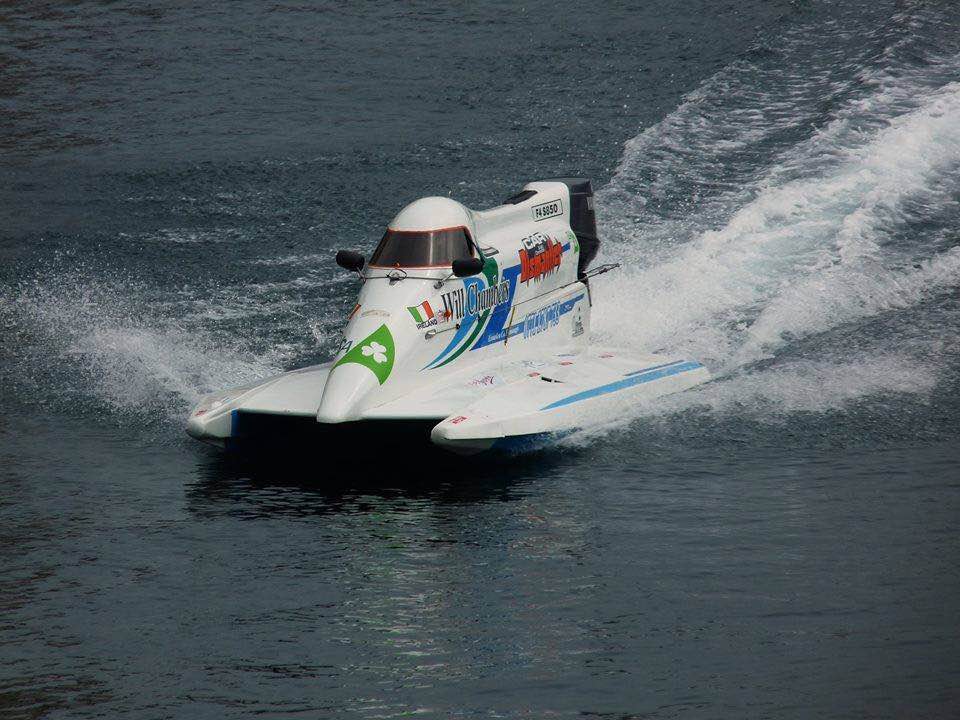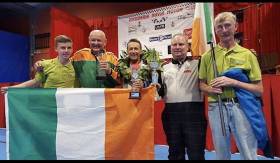Displaying items by tag: Dick Corley
Last weekend in Navia, Asturias, Spain, Hr850 and T850 Powerboat racing teams competed and represented their countries at the highest international level, the UIM World Championships. Within this group was Team Powerboat Ireland, a group of Irish Powerboat enthusiasts made up from members of North East Powerboat and Racing Club and the Irish Powerboat Racing Club.
Will Chambers (Hr850 Driver), Oliver Haire (T850 Driver) Denis Dillon (T850 Driver) Simon Haire (Crew) Dick Corley (Mechanic) veterans of previous UIM European Championships decided to pool their talents under the Banner of “Team Powerboat Ireland” and with the support of the ISA as the UIM National Authority, travel to the World Championships, represent their country and hopefully bring back UIM World Championship medals to Ireland.

The competition would not be easy as the Team found out on day 1. Will Chambers following on from his success at Navia the previous year with a UIM Silver in the European Championships was determined to follow up with a World Championship podium place. Competitive from the start he was up at the front when his race boat was holed and he had to abandon the race and lift his boat to safety. Oliver Haire also had the mechanical gremlins strike and was also lifted to safety. With no points on the score sheet for both Will and Oliver, Day 2 seemed a long way away and decisions had to be made as to what the Team would do. A Team meeting was held and a decision was made to work some long hours and repair the holed HR850 and replace the engine powerhead in the T850.
When Day two dawned, Team Powerboat Ireland were ready and with Denis Dillon having the only points on the scoresheet they knew it would be a challenge that would see man and machines pushed to the limit. And to the limit they were pushed with Will Chambers working his way up the standings with two fine second place finishes in the final heats which saw him take 3rd place overall in the HR850 Class and a UIM World Championship Bronze Medal.
There was to be no podium places for Denis Dillon and Oliver Haire but both finished in the rankings and were presented with their trophies. All were delighted that they had represented their country as best as they could and they knew they had competed against the best in the world. Plans are already afoot as to how to gain the extra edge that will see them advance in the standings for 2017.
A statement from the Team shortly after the final results:
“It’s being an amazing two days of racing, we have put blood sweat and tears into every practice, every qualifying, every race heat and we followed this up with a long evening maintaining both man and machine. During the event, we never let our passion determination and teamwork falter and for Will Chambers to achieve a UIM World Championship Bronze Medal It made the trip all worthwhile.
We knew when we left Ireland for the long journey to Spain that we would be competing against the best competitors in the world, this did not deter us and it just goes to show what a few guys with determination and Teamwork can achieve. We are very proud to have represented IRELAND on the World Stage and to bring back a “UIM World Championship Medal” in the HR850 Class is an honor and a privilege for all of us. The Team believes we have shown like our P750 racers before us what can be achieved, we feel with the right support & sponsorship, Irish Powerboat Racing Teams & Clubs working together can ensure that Team Ireland competes in UIM European & World Championships into the future, in regard to our UIM Medals we hope they are many more to come.”






























































